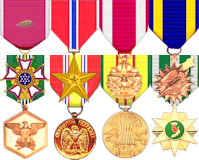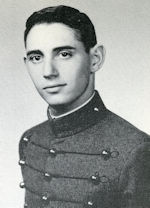COL Richard H. Sinnreich USA (Retired)Cullum: 25670 Class: 1965 Cadet Company: A2 Date of Birth: March 17, 1943 Date of Death: November 18, 2022 Died in: Oklahoma City, OK Interred: Body donated to medical science - View or Post a Eulogy |

|
 If you wish to understand Richard Hart “Rick” Sinnreich, you need to read two essays: the first is the memorial article he wrote for his father in the March 1999 issue of ASSEMBLY magazine; the second is his final column published in the Lawton Constitution (March 25, 2018). Rick’s father was a post-World War I Jewish immigrant boy from Austria. By the 1930s, Simon Sinnreich was sufficiently assimilated to gain appointment to West Point. He graduated in 1938, was commissioned in the Infantry, and fought in Europe in World War II. His most valued award, according to the memorial, was his Combat Infantryman Badge.
If you wish to understand Richard Hart “Rick” Sinnreich, you need to read two essays: the first is the memorial article he wrote for his father in the March 1999 issue of ASSEMBLY magazine; the second is his final column published in the Lawton Constitution (March 25, 2018). Rick’s father was a post-World War I Jewish immigrant boy from Austria. By the 1930s, Simon Sinnreich was sufficiently assimilated to gain appointment to West Point. He graduated in 1938, was commissioned in the Infantry, and fought in Europe in World War II. His most valued award, according to the memorial, was his Combat Infantryman Badge.
Rick became an accomplished Field Artillery officer, commanding from battery through division artillery. He was instrumental in developing concepts for artillery support for what would become AirLand Battle doctrine. When the Field Artillery branch was revived after the depredations of the “Long War,” Rick was invited to Fort Sill, OK to lecture officers with long combat but little artillery experience on practical requirements for large unit artillery operations.
Rick possessed one of the sharpest and most comprehensive minds of his generation. He was contagiously enthusiastic, energetic, and imaginative. He had the talent for offering superiors candid, informed advice and criticism without giving offense. He had the gift of making and keeping friends, though he could be sharp in his criticism. He was known and respected by officers of all grades in both the Army and Marine Corps. He and his wife, Carol, a gifted artist, were ornaments at any social gathering. Carol was his balance, his refuge, and his support.
Rick taught “National Security Affairs” in the USMA Department of Social Sciences. He served two summer internships on the NSC, first with Henry Kissinger as national security advisor and, a year later, Brent Scowcroft. These temporary appointments led to a 1975 assignment as speech writer and assistant XO to General Alexander Haig, the SACEUR/EUCOM commander.
Assignment to Haig’s personal staff broadened Rick’s understanding of complex political strategic issues. It also led to an opportunity to influence evolving Army doctrine. Rick and a colleague, Major John Landry, drafted a critique of the 1976 Field Manual 100-5, Operations, for Haig’s signature. The manual was written at Training and Doctrine Command under the inspiration and direct supervision of Haig’s commander in Vietnam, now General William E. DePuy. The substantive “Haig” criticism created something of a stir at TRADOC. In 1980, Rick was called to Washington, DC to assist in Haig’s confirmation as U.S. Secretary of State. He offered Haig advice on how to fit his worldview into the confirmation discourse while avoiding unnecessary resistance. Rick’s recommendations sometimes conflicted with those of his state department colleagues, but he had the nominee’s trust.
Following battalion command, Rick was assigned to the Army Staff to monitor implementation of AirLand Battle doctrine. In 1983, he was the first Army fellow at the Center for Strategic and International Studies. The following year he was appointed deputy director of the Army’s new School of Advanced Military Studies (SAMS) at Fort Leavenworth, KS.
SAMS, founded by Colonel Huba Wass de Czege, ran an intensive course in operational art for majors and lieutenant colonels. It was something of a conspiracy to infuse the new Army doctrine into the field. At SAMS, Wass de Czege and Lieutenant Colonel Don Holder were revising the 1982 FM 100-5 they had written to succeed the ’76 manual. Rick completed the final version of the new text, which closed the period of post-Vietnam doctrinal debate and guided Army operations in the 1991 Gulf War.
Rick served as SAMS’ second director, succeeding Wass de Czege and preceding Holder. He set the school on a strong foundation by gaining substantive support from the TRADOC commander and Army Chief of Staff. He provided intellectual leadership engaging all school members. He managed student selection, read every student monograph, and did his best to ensure graduates’ follow-on assignments to key planning positions on division and corps staffs. In 1987, Rick left SAMS to assume command of 9th Infantry Division Artillery (Motorized). He was subsequently appointed division chief of staff. He retired to Lawton, OK in 1990.
Following some large animal hunting in Africa, Rick became a member of the Lawton Charter Review Commission, and later the City Personnel Review Board. General Gordon Sullivan asked Rick to become reengaged in Army and Joint futures discussions. Rick remained involved in important-defense initiatives and studies for the next two decades.
Throughout his career, Rick contributed to public commentary on defense and other matters. He wrote a variety of studies for academic anthologies. He was coeditor, with Dr. Williamson Murray, of a series of books on history and strategy. He leaves behind a collection of 828 articles and weekly newspaper columns, written from 2000 to 2018, on a wide range of national and defense questions. His final column for the Lawton Constitution expressed concern for the health of the republic based on what he saw as an immoderate foreign policy and a failure of Congress and the electorate to play their proper constitutional roles. He summarized the vision that had long guided his political views. “I consider myself to be a classic conservative in the tradition of Edmund Burke, believing liberty to be…the hard-won product of an essential but fragile social compact imposing reciprocal obligations to society on the part of those enjoying it.”
A talented artilleryman, a creative thinker, a scholar in search of the truth, an academic leader, and a man of great personal integrity: West Point and the nation could ask for no more.
— SAMS Fellow, 1985-87
